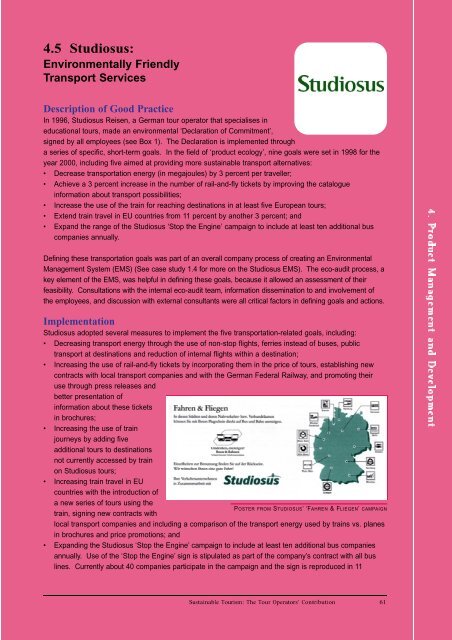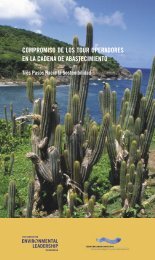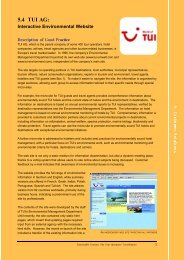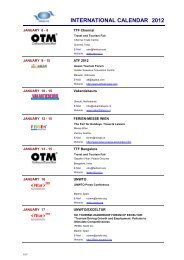4.5 Studiosus: - Tour Operators Initiative
4.5 Studiosus: - Tour Operators Initiative
4.5 Studiosus: - Tour Operators Initiative
Create successful ePaper yourself
Turn your PDF publications into a flip-book with our unique Google optimized e-Paper software.
<strong>4.5</strong> <strong>Studiosus</strong>:<br />
Environmentally Friendly<br />
Transport Services<br />
Description of Good Practice<br />
In 1996, <strong>Studiosus</strong> Reisen, a German tour operator that specialises in<br />
educational tours, made an environmental ‘Declaration of Commitment’,<br />
signed by all employees (see Box 1). The Declaration is implemented through<br />
a series of specific, short-term goals. In the field of ‘product ecology’, nine goals were set in 1998 for the<br />
year 2000, including five aimed at providing more sustainable transport alternatives:<br />
• Decrease transportation energy (in megajoules) by 3 percent per traveller;<br />
• Achieve a 3 percent increase in the number of rail-and-fly tickets by improving the catalogue<br />
information about transport possibilities;<br />
• Increase the use of the train for reaching destinations in at least five European tours;<br />
• Extend train travel in EU countries from 11 percent by another 3 percent; and<br />
• Expand the range of the <strong>Studiosus</strong> ‘Stop the Engine’ campaign to include at least ten additional bus<br />
companies annually.<br />
Defining these transportation goals was part of an overall company process of creating an Environmental<br />
Management System (EMS) (See case study 1.4 for more on the <strong>Studiosus</strong> EMS). The eco-audit process, a<br />
key element of the EMS, was helpful in defining these goals, because it allowed an assessment of their<br />
f e a s i b i l i t y. Consultations with the internal eco-audit team, information dissemination to and involvement of<br />
the employees, and discussion with external consultants were all critical factors in defining goals and actions.<br />
Implementation<br />
<strong>Studiosus</strong> adopted several measures to implement the five transportation-related goals, including:<br />
• Decreasing transport energy through the use of non-stop flights, ferries instead of buses, public<br />
transport at destinations and reduction of internal flights within a destination;<br />
• Increasing the use of rail-and-fly tickets by incorporating them in the price of tours, establishing new<br />
contracts with local transport companies and with the German Federal Railway, and promoting their<br />
use through press releases and<br />
better presentation of<br />
information about these tickets<br />
in brochures;<br />
• Increasing the use of train<br />
journeys by adding five<br />
additional tours to destinations<br />
not currently accessed by train<br />
on <strong>Studiosus</strong> tours;<br />
• Increasing train travel in EU<br />
countries with the introduction of<br />
a new series of tours using the<br />
PO S T E R F R O M ST U D I O S U S’ ‘ FA H R E N & FL I E G E N’ C A M PA I G N<br />
train, signing new contracts with<br />
local transport companies and including a comparison of the transport energy used by trains vs. planes<br />
in brochures and price promotions; and<br />
• Expanding the <strong>Studiosus</strong> ‘Stop the Engine’ campaign to include at least ten additional bus companies<br />
a n n u a l l y. Use of the ‘Stop the Engine’ sign is stipulated as part of the company’s contract with all bus<br />
lines. Currently about 40 companies participate in the campaign and the sign is reproduced in 11<br />
S ustainable To u r ism: The <strong>Tour</strong> Opera t o rs’ Contribution 6 1
languages, including Arabic and Chinese. Customers<br />
are informed about the campaign in their travel<br />
documents and by their tour guides and bus drivers.<br />
Monitoring is carried out by tour guides, the customers<br />
and the product managers.<br />
<strong>Studiosus</strong> also sends environmental questionnaires to<br />
partners such as bus companies, airlines and shipping<br />
companies, to ensure that its contracted companies<br />
perform according to the set standards. Feedback from<br />
customers is collected through a questionnaire distributed<br />
by travel guides at the end of the tour and either collected<br />
PO S T E R F R O M ST U D I O S U S’<br />
‘ S TO P T H E EN G I N E’ C A M PA I G N<br />
by the guides or mailed directly to the company by<br />
customers. An annual environmental report relating to the company’s ISO 14001 audit is published,<br />
summarizing the results of the programme.<br />
Benefits<br />
There have been several benefits from the introduction of environmentally friendly transport policies, both<br />
for <strong>Studiosus</strong> and for the environment, including:<br />
• <strong>Studiosus</strong> uses trains to travel to destinations much more often than the industry average, thus<br />
reducing energy consumption per client. Between 1995 and 1997, the use of trains for <strong>Studiosus</strong> tours<br />
6 2<br />
Box 1: The <strong>Studiosus</strong> ‘Declaration of Commitment’<br />
We will work towards maintaining cultural diversity and preserving the natural resources of our host<br />
countries and towards supporting tourism that places equal priority on being financially rewarding, socially<br />
aware and environmentally responsible.<br />
We will honour the interests, the independence and the drive to self-sufficiency demonstrated by the<br />
inhabitants of the countries we visit. We will respect their laws, traditions, customs and cultural<br />
uniqueness. By means of encounters with these people and information about them, we want to create a<br />
public forum which simultaneously supports human rights.<br />
We are dedicated to cooperative partnerships with the service industries and the local inhabitants of the<br />
host countries. We will work towards fair business conditions which support all participants fairly and<br />
e q u a l l y. In as many aspects of our work as possible, we want to support the active participation of local<br />
inhabitants in our tourism.<br />
We will give our tour guides special responsibility in ensuring that environmental and social awareness is<br />
upheld on our educational tours.<br />
We will refrain from travel, excursions and expeditions to closed regions whose inhabitants are largely<br />
uninfluenced by western civilization and to environmentally sensitive regions, unless it is certain that such<br />
travel can be undertaken without exercising any destructive influences. We will not promise our customers<br />
‘contact with “uncivilized” peoples’, because we are aware of the need of such peoples to be protected.<br />
We want to contribute to encouraging a common sense of responsibility for environmental and social<br />
issues among all participants in travel.<br />
We are willing to develop a common Code of Ethics for <strong>Tour</strong> <strong>Operators</strong> and work towards compliance<br />
within the framework of our professional associations.<br />
S ustainable To u r ism: The <strong>Tour</strong> Opera t o rs’ Contribution
exceeded the overall average for industry as a whole in Germany.<br />
• The company has gained positive publicity and improved its image through the programme. Several<br />
articles in newspapers and magazines have mentioned <strong>Studiosus</strong> as ‘the tour operator deeply<br />
committed to environmentally and socially responsible travelling in the German market’.<br />
• Feedback from tour guides, collected through special questionnaires, has been generally positive.<br />
• The company has seen an improved environmental and social sensitivity among partners and<br />
suppliers, both in questionnaires and in discussions with <strong>Studiosus</strong> product managers through a<br />
‘dialogue of civilizations’ (Forum der Bereisten) that has now taken place in 28 destinations.<br />
Comments<br />
The environmentally friendly transport services discussed in this case study are one of the six sections of<br />
<strong>Studiosus</strong>’ environment matrix [see Case Study 1.4]. The other areas of action include: destination<br />
management, environmentally friendly accommodation, food supply, tour guidance, and communication<br />
about sustainable practices. By combining the elements of these six sections of the matrix, <strong>Studiosus</strong><br />
developed some sample sustainable journeys with characteristics that include using only public transport<br />
(even for the long run), staying in small family-owned hotels, enjoying locally produced food, and meeting<br />
local people.<br />
S ustainable To u r ism: The <strong>Tour</strong> Opera t o rs’ Contribution 6 3






